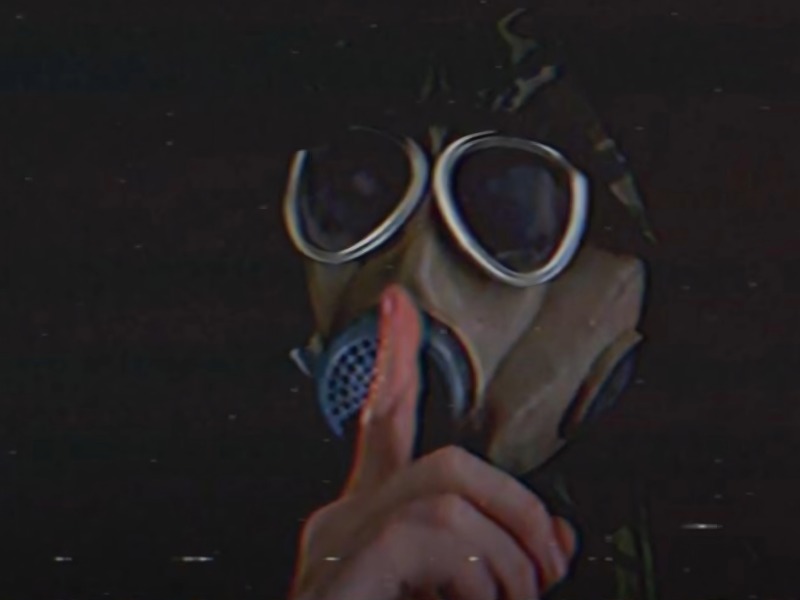Found-footage horror has always thrived on minimalism—the idea that terror feels closer, rawer, and more personal when a story is framed as something captured unintentionally or under duress. With Don’t Peek (2025), director Kyle Tague leans into that philosophy but adds a distinctly modern layer: influencer culture, algorithm-driven lives, and the blurred line between authenticity and performance. The result is a disturbing, thought-provoking horror film that is as much about the monster in the shadows as it is about the invisible audience behind every camera.
Don’t Peek isn’t just a cautionary tale; it’s a film that stares back at the viewer and forces us to examine why we watch—and why people continue recording even when they shouldn’t.
Plot Summary: The Vlog Life Meets Something Much Darker
The story centers on Rebecca and Paris Winter, a married YouTube couple whose channel features reaction content, home-life updates, and lifestyle vlogs. Their viewership has been dropping, tension is rising between them, and both feel the pressure to produce something—anything—that will revive their analytics.
When they move into a new home, they discover a box of old VHS tapes belonging to the previous occupant, a man rumored to be a serial killer. Instead of turning them over to authorities, they see an opportunity. If they watch and react to these tapes on camera, they might revive their struggling channel.
At first, the tapes are unsettling but not overtly supernatural—grainy footage, stalking behavior, eerie monologues from the man behind the camera. But as the couple continues watching, strange things begin happening in their home. Unexplained noises. Moving shadows. Unfinished segments in the tapes that seem to update themselves. A figure—“Mr. Peek”—who appears both in the old footage and, terrifyingly, behind the Winters in present day.
What begins as exploitation for views spirals into a nightmare where past and present collapse, and the Winters must face the consequences of their obsession with being watched.
Found-Footage Style: A Mix of Digital and Analog Terror
One of the most compelling filmmaking choices is the contrast between the Winters’ crisp, modern vlog footage and the gritty, degraded VHS recordings. This creates a dual-horror experience:
1. Digital Horror (The Present)
Rebecca and Paris’s vlogs are polished, slightly performative, and brightly lit. The terror here is rooted in psychological tension—the sense that every moment is being crafted for an audience, even when the couple begins fearing for their lives.
2. Analog Horror (The Past)
The VHS tapes are claustrophobic, static-filled, and intimate in a deeply uncomfortable way. There’s no score, no editing—just the killer’s raw gaze. The analog recordings feel like trespassing into someone’s darkest impulses.
The two styles blend over time until they feel like they’re bleeding into one another—a deliberate metaphor for how the past and present horrors merge.
Themes: More Than Just Scares
The Horror of Being Seen
Don’t Peek explores the unsettling truth that today’s horror isn’t just being watched—it’s needing to be watched. Rebecca and Paris can’t stop filming, even as danger grows, because their identity and livelihood are tied to being perceived.
The Archive of Violence
The VHS tapes represent violence preserved for decades—memories that refuse to decay. Meanwhile, digital content is endless, constantly uploaded, never fully erased. The film suggests that recording horror might be just as harmful as committing it.
Relationship Breakdown Under the Lens
The constant pressure to perform creates cracks in the Winters’ marriage long before the supernatural elements emerge. Their arguments often reveal a deeper fear: that they no longer know where the act ends and the real relationship begins.
The Viewer’s Responsibility
Audience complicity is a subtle but powerful theme. Why do people watch true-crime videos, reaction channels, or disturbing footage? What is the emotional cost of consuming real trauma as entertainment?
Performance Breakdown
Kelly Rook Daly as Rebecca
Daly is the emotional core of the film. Her performance is layered, shifting between influencer persona, fear, guilt, and vulnerability. She sells the found-footage realism by never feeling overly staged.
Jonathan Faircloth Kirk as Paris
Paris brings tension and unpredictability. His frustration with their declining channel adds an uncomfortable desperation that hints he might spiral even without the supernatural influence.
Robbie Allen as Mr. Peek
Visually, Mr. Peek is terrifying—slow, deliberate movements, a blank mask, and a presence that feels disturbingly real. He doesn’t need CGI or jump scares; his menace comes from how intimately he films his victims.
Strengths: What the Film Nails
✔ Effective Slow-Burn Tension
Rather than throwing scares immediately, the film builds dread through suggestion, atmosphere, and off-camera terror.
✔ Realistic Vlogging Environment
The film perfectly captures the rhythm of small-scale YouTube creators—editing setups, discussions about thumbnails, performing for analytics, and the subtle exhaustion behind constant content creation.
✔ Strong Commentary on Surveillance
It’s not just about being watched by a killer—it’s about being watched by an audience, algorithms, and expectations.
✔ A Chilling, Memorable Third Act
Without spoiling anything, the climax merges digital and analog recording in a sequence that feels genuinely innovative for the found-footage subgenre.
Weaknesses: Where It Stumbles
✘ Some Pacing Issues
The middle of the film drags slightly, especially if you’re not engaged with the couple’s dynamics. A few scenes could’ve been trimmed without losing impact.
✘ Budget Limitations
While the film does extremely well for its budget, certain sequences show limitations—especially in effects-heavy moments.
✘ Occasional Unnatural Vlog Dialogue
Some lines feel like people trying to sound like influencers rather than actual influencers themselves. It’s a small quirk but noticeable to viewers familiar with YouTube culture.
Final Verdict
Don’t Peek (2025) is a bold, unsettling, and surprisingly thoughtful found-footage horror film that uses its limitations creatively. It’s not just about scares—it’s about what it means to live your life on camera, what we choose to watch, and how easily curiosity becomes obsession.
It excels in atmosphere, innovation, and thematic depth, making it one of the more memorable indie horrors of 2025.
